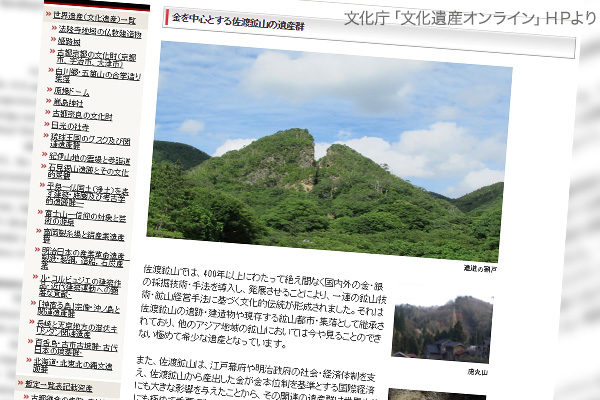On December 28 last year, the Council for Cultural Affairs, an advisory panel to the Japanese Agency for Cultural Affairs, selected a goldmine site on the island of Sado, Niigata Prefecture, as a candidate for World Heritage designation by the United Nations Educational Scientific and Cultural Organization. But the agency noted that the candidate selection did not mean a final decision to recommend the site to UNESCO and that the selection would be comprehensively examined within the government. February 1 is the deadline for the government to submit a written recommendation to UNESCO. In an unusual situation, however, the government has not made any decision on the matter even past mid-January.
Why has the unusual situation come? The government would not clearly state the reason. But an apparent reason is the opposition from the South Korean government and private sectors against the selection.
On the day when the selection was announced, the South Korean Foreign Ministry issued a statement saying, “It is lamentable for Japan to seek the World Heritage designation for the Sado goldmines, a site of forced labor. We urge Japan to immediately withdraw the selection.” South Korean mass media also have been running a daily campaign claiming the Sado goldmines is a site of forced Korean labor.
No Korean forced labor
Claims by the South Koreans run counter to historical facts. Last April 27, Japan’s then Yoshihide Suga administration made a cabinet decision to deny Japan’s wartime mobilization of Korean workers as representing forced labor.
“The government believes that labor provided through recruitment, official job placement support or requisition does not amount to ‘forced labor’ as specified in the Forced Labor Convention and that it is not appropriate to describe such labor as ‘forced labor,’” the decision said.
The Forced Labor Convention, which Japan ratified before World War II, provides that the wartime mobilization of workers shall not be included in forced labor that violates international law.
When Japan’s Meiji industrial revolution sites including the Hashima Coal Mine in Nagasaki Prefecture were designated as UNESCO World Heritage in 2015, the Japanese government issued a statement saying that “Japan is prepared to take measures that allow an understanding that there were a large number of Koreans and others who were brought against their will and forced to work under harsh conditions in the 1940s at some of the sites, and that, during World War II, the Government of Japan also implemented its policy of requisition.” The phrase “forced to work” was used there. And the requisition from September 1944 was legally binding and implemented “against their will.” However, the same thing can be said about the miliary draft and requisition applied to the Japanese. The government statement admitted only this. It did not admit any “forced labor” violating international law.
Don’t avoid historical debate
The problem with the Japanese government, particularly with the Foreign Ministry, is that it has failed to internationally communicate the historical fact that Japan has never imposed forced labor on Koreans.
Niigata Prefecture and Sado City that promote the World Heritage designation of the Sado goldmine site had included facilities built since the Meiji Period for the designation in their first proposal given in 2007. This time, however, they have limited the designation proposal to facilities built in the Edo Period before the Meiji Restoration to avoid any historical awareness debate. Even if they avoid historical debate, South Korea would no doubt make false accusation against “forced labor.” Japan has no choice but to frontally rebut and try to communicate truth to the international community.
Tsutomu Nishioka is a senior fellow and a Planning Committee member at the Japan Institute for National Fundamentals and a visiting professor at Reitaku University. He covers South and North Koreas.


